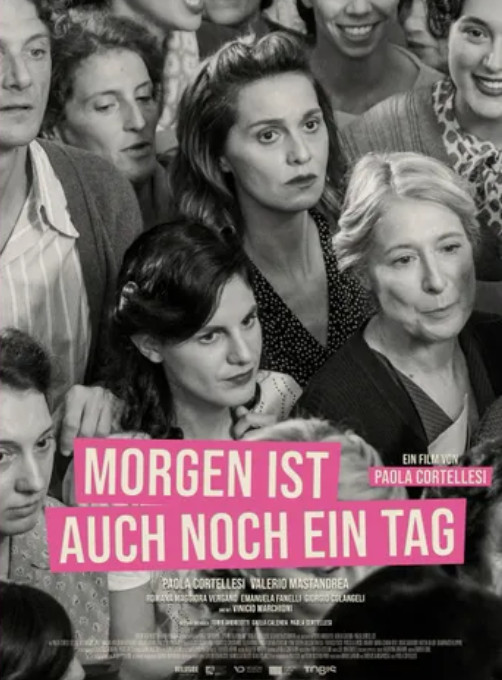A comment to the 2023 film “Morgen ist auch noch ein Tag“ by Paola Cortellesi
I approached this film with great scepticism. And the very first scene confirmed what I feared it would be: another misandrist attack on men. We saw a bad man hit his innocent wife in the face. After a few minutes a good man turned up, but in the form of (as you could also expect) an Afro-American soldier, which suggests that black is better than white – another postmodern message (for instance in the film “Roads”).
However, yet another few minutes later I was carried away by a touching scene. A fourth person (a white man) showed affection for the abused woman. This man turned out to be a love from lang ago, still loving. Now the film offered hope.
Realism and symbolism
“Morgen ist auch noch ein Tag“ (Tomorrow is yet another day) plays in immediate post-war Italy. It is presented in black and white, a feature which in this case helps bring us back in time (it escapes being “opposite kitsch”). The film ends with the first election by which women could vote in Italy. We see a crowd of women approaching the ballots and amongst them the now helpless, previously violent, man of the first scene, searching in vain for his wife and victim. The positions of power are turning.

Much like the black-and-white films used to do, this film tells us a story in a straightforward, chronological way. We see poor people in a small Italian town now benevolently controlled by American soldiers. But still, it is a film of our day and full of symbolic events.
There is a brief moment of surrealism among the otherwise realistic scenes. When the male protagonist violently “punishes” his wife for alleged carelessness in the kitchen, the two suddenly make a few quick dancing steps! This brief diversion into surrealism reminds us that we see a film, not the 1946 reality itself. However, and potentially more interesting, a psychologist might nod at this scene. A certain psychological theory, sometimes known as “system theory”, emphasizes, that when a couple fights, both have an active role – not only the one who apparently dominate. It is a “dance”. Still, introducing this perspective into the film does not relieve the violent husband the slightest of guilt: we see no provocation or similar on the part of the wife.
Sympathy
Inevitably, we are carried away in sympathy for the female protagonist. However not all women in the film appear sympathetic. We see women who are enviously nagging and fighting with each other. Is this because they have no power in other directions? Or is this rather a part of their culture or even nature? On the other hand, our protagonist has a good woman friend, who helps opening her eyes. We passionately hope that “our woman” will find a way out.
Like in a thriller we are first led to believe she will leave her husband and flee with her old, never-lived love. But she has three children – what about them? If you would worry about that, you would ultimately find you shouldn’t. The protagonist does not flee, she stays and votes. From that moment, everything will be different, we understand. Dignity and well-being for women comes with political power. This is the ideological message of the film.
The old man dies
However, one more dramatic thing happens on the 1946 election day. “The old man”– the father of the male protagonist – dies. Surprisingly, Mr. Violent Husband now falls on his knees and complains to God for his loss.
Was the father so important? Throughout the film we have seen him in bed, weakened by old age and illness. But there was a somewhat important conversation between father and son – about male control in the family. Up to discussion, however, was only the question of enforcing “male rule” on a daily basis (younger man’s practice) or by one big blow early in the marriage (old man’s advice).
Of course, the death of the old man may be seen as the death of a “men’s regime”. The death is also woven into the story as a thriller. Accidentally, the woman is forced to abandon her plan A – to flee with the old love – and switch to plan B, by which she ends up staying, but also voting. The end of the old regime is ushered in by the death of the old man and is completed when the previously violent husband fumbles around in a crowd of women about to vote.
Provocation anyway?
Generally, this is a well-made film in contrast to the many boring films nowadays, filled with women’s complaints and more or less conspicuously bad men (just count!) However, in spite of its artistic quality, I believe the film suffers from an important shortcoming. The film deals with two kinds of power: political power and violence in the family. What is missing, however, is other kinds of power in the family (and elsewhere) – like verbal power or psychological/social manipulation. The above-mentioned moment of surrealism opens the door to “system theory”. The film, however, does not walk through it.
Perhaps this is the real provocation:
Hey men, we are now in control of the state and violence in the family is excluded. You may have heard of verbal and psychological/social manipulation, and in our film, we admit to it – literally in a glimpse. But otherwise, this special power remains in darkness. – Paola Cortellesi & Co, 2023 [my interpretation]
[…] er poenget? Vi tilbyr her en tolkning som setter deg på sporet av en annen historie om menn, kvinner og makt. (På engelsk – du ledes […]